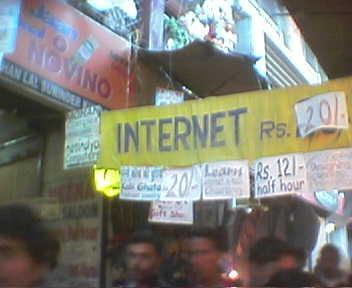The approach of regulating Cyber cafe is just not restricted to Maharastra or Karnataka but also at Ahmedabad (http://www.123bharath.com/index.php?action=fullnews&id=22233 )kolkata & Hyderabad. We at ApiAp belive the proposed regulations will have a multiple repurcussions: ENFORCEMENT PROBLEM: To any industry, governance/ regulations show sign of maturity & brings legitimacy but unfortunately the proposed law will be weak in enforcement & further it will be prone to be misused . ( http://apiap.blogspot.com/2004/08/fake-police-raids.html ) Our members are worried of increased the police harassment or private agencies who claim to represent the local police, anti piracy cell etc. Many would opt to go underground (As convert into a sham Computer training institute etc) this will actually increase the nascent Cyber crime cell ' burden. Communist China has been trying with such regulations since year 2000 & has not yet achieved much success ( http://www.theregister.co.uk/2004/11/01/china_net_crackdown/ ) , how can democratic India achieve it? PRIVACY: The proposed law makes the Cyber cafe operator responsible in managing the visitor’s database. The average age of a cafe operator is less than 22 years. Can we depend on the young Cyber cafe operator capability to safe guard the data from being misused/stolen? Or unknowingly become a breeding ground for cyber stalkers. SUSTAINABILITY: The Internet cafe industry has be a boon to the customer & the entrepreneur in many third world countries where basic education or electricity is not available; Cyber cafes have been a boon for entrepreneur to get to know opportunities in Info tech offers them to learn the trade while they earn & race straight into the Information super highway - Given the low entry/exit barrier to the industry. & Intense competition. The access rate is just Rs 10 to 20/- per hour that barely covers expenses. Today a small operator earns less than a cushy job in a call center; the average mortality is less than 3 years. They eventually migrate to better opportunities as in vending computer hardware, data processing, programming etc. & a new breed of entreprenuer takes their place. With the proposed regulations, how many micro entrepreneurs will dare to venture in such a business? Who bears the brunt ? The brunt of such regulations will be borne by masses that are waiting to embrace the digital world. ITU puts Internet penetration at 1.59 %in India. How will the rest of the 98.41% get an opportunity to acquaint the power of the WWW ? Today our scare resources are competing between better education / drinking water / health & other issues, Can we expect each of them invest 14 months gross income to buy a personal computer ( cost of computer to per capita income of India, yr 2002 estimate )? In all we appeal don't burn the bridge that is aiding to close the Digital Divide.
skip to main |
skip to sidebar

Association of Public ICT Tools Access Provider, A self help forum for Independent Cyber cafe( also known as Internet Cafe / Telecenters / Telecentres )owners across the world. send in your querries & mail on contact-AT-apiap-DOT-org
About Me

- ApiAp
- This blog explores "shared ICT Access " points across the world called variously as Internet Kiosk, Telecentre, Internet Cafe, Cyber Cafe, Warnet, Manga Kissa , PC Bang, Internet Cabinas, Knowledge Centers..... Edited by Ashish Saboo Questions / Queries/ Comments mails us at contact AT apiap DOT org
Labels
- compliance (1)
- issues (1)
- privacy (1)
- regulatory (1)